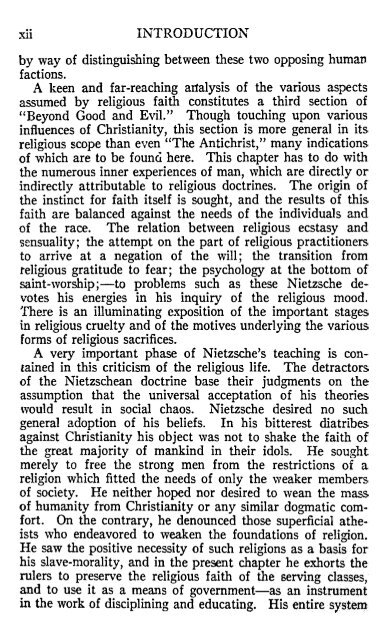- Page 7 and 8: PUBLISHERS' NOTE Mr. Willard Huntin
- Page 10 and 11: a INTRODUCTION No philosophersince
- Page 12 and 13: INTRODUCTION ix Human" ("Menscklich
- Page 16 and 17: INTRODUCTION xiii of ethics is buil
- Page 18 and 19: that if,indeed, nay PREFACE Supposi
- Page 20: which, they PREFACE and twice attem
- Page 23 and 24: This in 2 BEYOND GOOD AND EVIL befo
- Page 25 and 26: 4 BEYOND GOOD AND EVIL logicaldeman
- Page 27 and 28: "better,"if BEYOND GOOD AND EVIL It
- Page 29 and 30: ^how ^how BEYOND GOOD AND EVIL 8 Th
- Page 31 and 32: 10 BEYOND GOOD AND EVIL mortallywea
- Page 33 and 34: an the 12 BEYOND GOOD AND EVIL yout
- Page 35 and 36: and, 14 BEYOND GOOD AND EVIL where
- Page 37 and 38: that 1 6 BEYOND GOOD AND EVIL worke
- Page 39 and 40: "To namely,that even 1 8 BEYOND GOO
- Page 41 and 42: was and 20 BEYOND GOOD AND EVIL thi
- Page 43 and 44: to I So 2 2 BEYOND GOOD AND EVIL me
- Page 45 and 46: 24 BEYOND GOOD AND EVIL more as we
- Page 47 and 48: still 26 BEYOND GOOD AND EVIL which
- Page 49 and 50: as how CHAPTER II The Free Spirit 2
- Page 51 and 52: merely always 30 BEYOND GOOD AND EV
- Page 53 and 54: sometimes and of 32 BEYOND GOOD AND
- Page 55 and 56: pardonme 34 BEYOND GOOD AND EVIL ph
- Page 57 and 58: 36 BEYOND GOOD AND EVIL sulmans,in
- Page 59 and 60: is In 38 BEYOND GOOD AND EVIL an ac
- Page 61 and 62: an 40 BEYOND GOOD AND EVIL they not
- Page 63 and 64: " as 42 BEYOND GOOD AND EVIL philos
- Page 65 and 66:
On 44 BEYOND GOOD AND EVIL 37 "What
- Page 67 and 68:
there 46 BEYOND GOOD AND EVIL shame
- Page 69 and 70:
that for the 48 BEYOND GOOD AND EVI
- Page 71 and 72:
we $0 BEYOND GOOD AND EVIL under th
- Page 73 and 74:
" it CHAPTER III The Religious Mood
- Page 75 and 76:
his 54 BEYOND GOOD AND EVIL 1 cruel
- Page 77 and 78:
" ^namely If namely, 56 BEYOND GOOD
- Page 79 and 80:
the S8 BEYOND GOOD AND EVIL 49 i Th
- Page 81 and 82:
and This and 6o BEYOND GOOD AND EVI
- Page 83 and 84:
" whoever ^and 62 BEYOND GOOD AND E
- Page 85 and 86:
64 BEYOND GOOD AND EVIL specks and
- Page 87 and 88:
this 66 BEYOND GOOD AND EVIL passio
- Page 89 and 90:
68 BEYOND GOOD AND EVIL able filth
- Page 91 and 92:
are into 70 BEYOND GOOD AND EVIL (i
- Page 93 and 94:
CHAPTER IV Apophthegms and Interlud
- Page 95 and 96:
74 BEYOND GOOD AND EVIL 72 It isnot
- Page 97 and 98:
j6 BEYOND GOOD AND EVIL 83 Insttnct
- Page 99 and 100:
78 BEYOND GOOD AND EVIL 95 To be as
- Page 101 and 102:
8o BEYOND GOOD AND EVIL io6 By mean
- Page 103 and 104:
S2 BEYOND GOOD AND EVIL ii8 } There
- Page 105 and 106:
the 84 BEYOND GOOD AND EVIL m on th
- Page 107 and 108:
86 BEYOND GOOD AND EVIL 140 Advice
- Page 109 and 110:
"S BEYOND GOOD AND EVIL It is not e
- Page 111 and 112:
90 BEYOND GOOD AND EVIL God as I lo
- Page 113 and 114:
iaithin a cause. 181 yz BEYOND GOOD
- Page 115 and 116:
" as CHAPTER V The Natural History
- Page 117 and 118:
The 96 BEYOND GOOD AND EVIL says (p
- Page 119 and 120:
" nowadays, all 98 BEYOND GOOD AND
- Page 121 and 122:
good. loo BEYOND GOOD AND EVIL powe
- Page 123 and 124:
"" Plato,more 102 BEYOND GOOD AND E
- Page 125 and 126:
" without 104 BEYOND GOOD AND EVIL
- Page 127 and 128:
io6 BEYOND GOOD AND EVIL I for all
- Page 129 and 130:
ecause for io8 BEYOND GOOD AND EVIL
- Page 131 and 132:
such no BEYOND GOOD AND EVIL role o
- Page 133 and 134:
" that 112 BEYOND GOOD AND EVIL fai
- Page 135 and 136:
they the 114 BEYOND GOOD AND EVIL t
- Page 137 and 138:
ii6 BEYOND GOOD AND EVIL sympathy,i
- Page 139 and 140:
this " as ^he " ii8 BEYOND GOOD AND
- Page 141 and 142:
what the .120 BEYOND GOOD AND EVIL
- Page 143 and 144:
122 BEYOND GOOD AND EVIl that to wh
- Page 145 and 146:
to 124 BEYOND GOOD AND EVIL in the
- Page 147 and 148:
I if he 126 BEYOND GOOD AND EVIL he
- Page 149 and 150:
a they 128 BEYOND GOOD AND EVIL Aga
- Page 151 and 152:
namely,in the 130 BEYOND GOOD AND E
- Page 153 and 154:
and 132 BEYOND GOOD AND EVIL many i
- Page 155 and 156:
and nevertheless 134 BEYOND GOOD AN
- Page 157 and 158:
" ^have Are 136 BEYOND GOOD AND EVI
- Page 159 and 160:
138 BEYOND GOOD AND EVIL too readil
- Page 161 and 162:
140 BEYOND GOOD AND EVIL course and
- Page 163 and 164:
" and it 142 BEYOND GOOD AND EVIL o
- Page 165 and 166:
it 144 BEYOND GOOD AND EVIL gence w
- Page 167 and 168:
" and 146 BEYOND GOOD AND EVIL 221
- Page 169 and 170:
it 148 BEYOND GOOD AND EVIL of supr
- Page 171 and 172:
" when " we ^50 BEYOND GOOD AND EVI
- Page 173 and 174:
" preciselyhere, we yes, So to 1 52
- Page 175 and 176:
to that 154 BEYOND GOOD AND EVIL 1
- Page 177 and 178:
as, One 156 BEYOND GOOD AND EVIL en
- Page 179 and 180:
is 158 BEYOND GOOD AND EVIL fundame
- Page 181 and 182:
for i6o BEYOND GOOD AND EVIL some d
- Page 183 and 184:
why, she 1 62 BEYOND GOOD AND EVIL
- Page 185 and 186:
the 1 64 BEYOND GOOD AND EVIL velop
- Page 187 and 188:
or what 1 66 BEYOND GOOD AND EVIL p
- Page 189 and 190:
almost 1 68 BEYOND GOOD AND EVIL co
- Page 191 and 192:
it it CHAPTER VIII Peoples and Coun
- Page 193 and 194:
172 BEYOND GOOD AND EVIL rapidlymov
- Page 195 and 196:
are 174 BEYOND GOOD AND EVIL art an
- Page 197 and 198:
they But 176 BEYOND GOOD AND EVIL p
- Page 199 and 200:
178 BEYOND GOOD AND EVIL blue,empty
- Page 201 and 202:
art for i8o BEYOND GOOD AND EVIL ma
- Page 203 and 204:
something that t82 BEYOND GOOD AND
- Page 205 and 206:
" and the i84 BEYOND GOOD AND EVIL
- Page 207 and 208:
could 1 85 BEYOND GOOD AND EVIL Jew
- Page 209 and 210:
1 88 BEYOND GOOD AND EVIL factorily
- Page 211 and 212:
" exercises " theymay " and the 190
- Page 213 and 214:
the 192 BEYOND GOOD AND EVIL '"nthe
- Page 215 and 216:
the whither? they I 194 BEYOND GOOD
- Page 217 and 218:
ye Rome's what 196 BEYOND GOOD AND
- Page 219 and 220:
they 198 BEYOND GOOD AND EVIL origi
- Page 221 and 222:
" I that 200 BEYOND GOOD AND EVIL i
- Page 223 and 224:
or the It the 202 BEYOND GOOD AND E
- Page 225 and 226:
204 BEYOND GOOD AND EVIL Here is th
- Page 227 and 228:
It 2o6 BEYOND GOOD AND EVIL a bad a
- Page 229 and 230:
2o8 BEYOND GOOD AND EVIL the enormo
- Page 231 and 232:
it 2IO BEYOND GOOD AND EVIL veiled
- Page 233 and 234:
212 BEYOND GOOD AND EVIL virtuous a
- Page 235 and 236:
and these 214 BEYOND GOOD AND EVIL
- Page 237 and 238:
everence 2i6 BEYOND GOOD AND EVIL t
- Page 239 and 240:
But who 2i8 BEYOND GOOD AND EVIL se
- Page 241 and 242:
when for or and Happy spoilall 220
- Page 243 and 244:
" "Will refresh "222 BEYOND GOOD AN
- Page 245 and 246:
otherwise for "in a or 224 BEYOND G
- Page 247 and 248:
to namely, as 226 BEYOND GOOD AND E
- Page 249 and 250:
228 BEYOND GOOD AND EVIL 291 Man, a
- Page 251 and 252:
not 230 BEYOND GOOD AND EVIL are fo
- Page 253 and 254:
more have He 232 BEYOND GOOD AND EV
- Page 255 and 256:
FROM THE HEIGHTS By F. W, Nietzsche
- Page 257 and 258:
Have ^better 236 BEYOND GOOD AND EV




